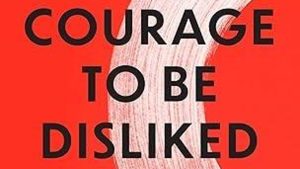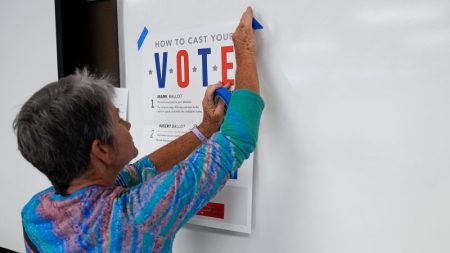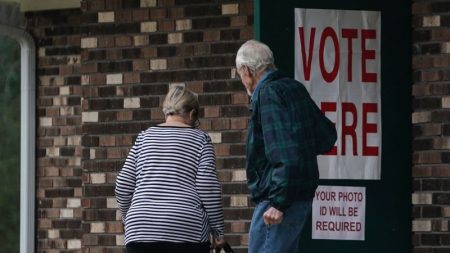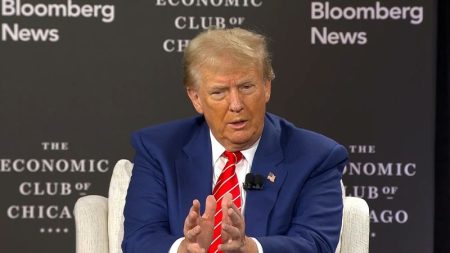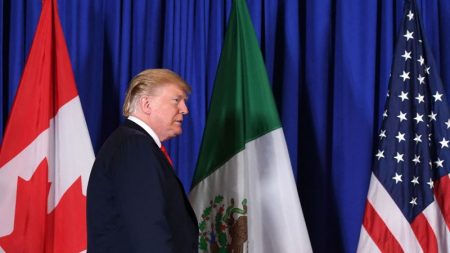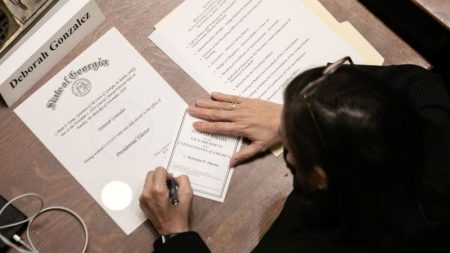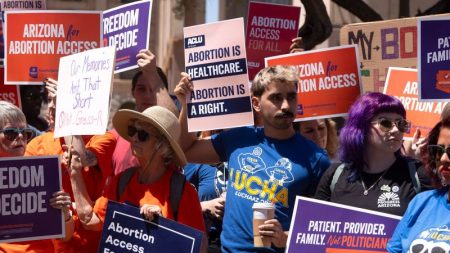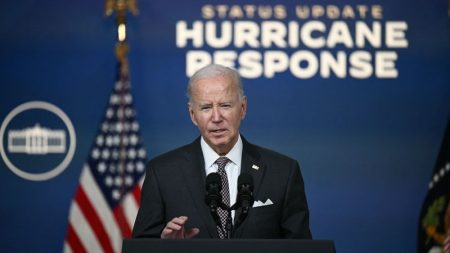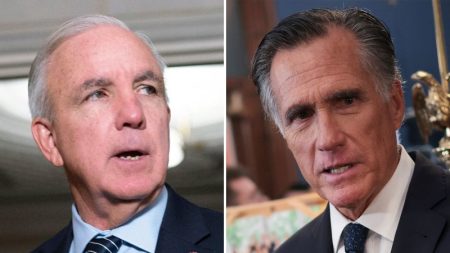Five of the Republican presidential candidates made a variety of false, misleading or lacking-in-context claims on Wednesday during the third debate of the 2024 party primary.
The frontrunner in the race, former President Donald Trump, again skipped the debate in favor of his own speech. Here is a fact check of some of the claims from candidates who were on the debate stage in Miami.
During a back-and-forth during the GOP debate on Wednesday about how the candidates would address incidents of antisemitism on college campuses in the wake of the Israel-Hamas conflict, Gov. Ron DeSantis said President Joe Biden is combating Islamophobia instead of supporting Jewish students.
“Not only is he not helping the Jewish students, who are being persecuted, he is launching an initiative to combat so-called Islamophobia. No, it’s antisemitism that’s spiraling out of control,” DeSantis said.
Facts First: This is misleading. While the Biden administration announced last week that it is developing a national strategy to counter Islamophobia, the White House already released a national strategy to combat antisemitism in May.
Earlier this week, the Department of Education issued guidance reminding schools that they have a legal obligation to address incidents of both antisemitism and Islamophobia. The guidance specifically said that schools must address discrimination based on race, color, or national origin – including against those who are Jewish, Israeli, Muslim, Arab or Palestinian.
“When it comes to antisemitism or Islamophobia, that has no place on our college campuses or in our schools,” Education Secretary Miguel Cardona told CNN.
Biden has repeatedly denounced antisemitism, both after the Hamas attack and for years before.
From CNN’s Katie Lobosco
Copy: Asked about supporting the use of military force against Iran in response to the recent attacks on US troops in Iraq and Syria by Iranian proxy groups, Nikki Haley said, “The idea that our men and women could be targeted, and that we’ve allowed almost 100 hits to happen under Biden’s watch is unthinkable.”
Facts first: Haley’s figure is incorrect. As of Wednesday, Iranian-backed groups had targeted US and coalition forces in Iraq and Syria at least 41 times since October 17 with one-way attack drones or rocket attacks. The most recent was a multi-rocket attack on Wednesday, on forces at Shaddadi, Syria.
Haley also said that the US needed to “go and take out their infrastructure that they are using to make those strikes with so they can never do it again.” A senior military official told reporters on Wednesday that an airstrike that day by US F-15 fighter jets hit a weapons storage facility used by Iran’s Islamic Revolutionary Corps Guard that is believed to house “weapons that we believe are likely used in many of the strikes that have taken place against our forces here in the region.”
From CNN’s Haley Britzky
Scott on Biden and Iran
Sen. Tim Scott of South Carolina said during Wednesday’s GOP debate in Miami, “Frankly, President Biden has sent billions to Iran.”
Facts First: This needs context. Scott didn’t explain that the $6 billion in question was not “sent” from the US itself and is not money from US taxpayers. It is $6 billion of Iran’s own money, from oil sales, that had been frozen in restricted South Korean accounts until the Biden administration agreed in September to allow it to be transferred to restricted accounts in Qatar – to be used with US approval by Iran for certain specified humanitarian purposes – as part of a deal in which Iran agreed to free five Americans the US had deemed wrongfully detained.
The Biden administration has repeatedly said that none of the $6 billion has been spent yet. And in early October, after the Hamas attack on Israel, Deputy Treasury Secretary Wally Adeyemo told House Democrats that the US and Qatar had reached a “quiet understanding” to not allow Iran to access any of the money for the time being, a source in the room told CNN in October. (While Secretary of State Antony Blinken did not confirm that a “quiet understanding” had been reached, he made clear the US is able to freeze the funds.)
Even before that, the Biden administration emphasized that the Iranian government would not be able to pocket the money itself and that it could only be used, under strict US supervision, to make humanitarian purchases from approved vendors. Some critics of the Biden administration and the deal with Iran have fairly pointed out, however, that Iran getting access to $6 billion for humanitarian purposes could free up that same amount of its own money to be used to fund terror.
From CNN’s Daniel Dale
Ramaswamy on Hunter Biden and Ukraine
Candidate Vivek Ramaswamy claimed during the GOP debate on Wednesday that “Joe Biden’s son Hunter got a $5 billion bribe from Ukraine.” He claimed that this bribe was the reason the US has sent so much aid to Ukraine, which was invaded by Russia last year.
Facts First: The claim that any member of the Biden family received a bribe is unproven. An FBI informant who relayed the claim to the FBI in 2020 was merely reporting something he said he had been told by a Ukrainian businessman, the chief executive of the energy company where Hunter Biden had served on the board of directors; the informant provided no proof to the FBI, and no proof has publicly emerged in the subsequent years. In addition, there is no evidence that US wartime aid to Ukraine – which has been approved by bipartisan majorities in Congress – has anything to do with the president’s son.
According to an internal FBI document made public by Republican Sen. Chuck Grassley of Iowa earlier this year over the strong objections of the FBI, the informant told the bureau in 2020 – when Donald Trump was president – that the CEO of Burisma, Mykola Zlochevsky, had claimed in 2016 that he made a $5 million payment to “one Biden” and another $5 million payment to “another Biden.” But the FBI document did not contain any proof for the claim, and the document said the informant was “not able to provide any further opinion as to the veracity” of the claim.
Republicans have tried to boost the credibility of the allegation by saying it was in an FBI document and that the FBI had viewed the informant as highly credible. But the document merely memorialized the information provided by the informant; it does not demonstrate that the information is true. And Hunter Biden’s former business associate Devon Archer testified to the House Oversight Committee earlier this year that he had not been aware of any such payments to the Bidens; Archer characterized Zlochevsky’s reported claim as an example of the Ukrainian businessman embellishing his influence.
From CNN’s Daniel Dale, Marshall Cohen and Annie Grayer
Ramaswamy on the 2016 and 2020 elections
In his opening remarks during Wednesday’s debate, Vivek Ramaswamy accused the media of interfering in the outcome of previous US elections.
“This media rigged the 2016 election, they rigged the 2020 election with the Hunter Biden laptop story and they’re going to rig this election unless we have accountability,” Ramaswamy said.
Facts First: This claim is false. Neither election was “rigged” and there is no evidence of any fraud large enough to have changed the outcome.
Officials from the Trump administration’s Department of Homeland Security, along with state election officials, said in a 2020 statement: “The November 3rd election was the most secure in American history.”
And tellingly, in Ramaswamy’s own 2022 book “Nation of Victims,” he writes that the “2016 election wasn’t stolen in a literal sense” and that he hadn’t seen “convincing evidence” that the 2020 election was stolen or rigged.
“The fact that all of our governmental institutions so unanimously found no evidence of significant fraud is telling. Furthermore, I’ve talked to many Republicans at all levels of government, and not one has ever presented convincing evidence that the 2020 election was stolen from President Trump; very few have seriously tried. I don’t believe that most Republican politicians actually think the election was stolen,” Ramaswamy wrote.
Asked about this change in his stance by NBC’s Chuck Todd in August, Ramaswamy claimed that in his books he also discussed what he did see as consequential election interference in 2020 – how “big tech” had worked to prevent the spread of a late-campaign story related to Hunter Biden’s laptop. However, Ramaswamy’s claim during the debate was directed not at tech companies but the media, who were actually the first to break the story around the laptop.
Ramaswamy has previously argued that the media spread an unfair narrative of Russian collusion in the 2016 election that robbed Trump of the ability to do the job after he was elected. However, a bipartisan report from the Senate Intelligence Committee backed the US intelligence community’s conclusion that Russia interfered in the 2016 presidential election to help then-candidate Donald Trump.
From CNN’s Tara Sumbramaniam
Former South Carolina Gov. Nikki Haley once again attacked Florida Gov. Ron DeSantis for his record on fracking after their heated exchange on the topic during the second GOP debate.
“On the energy side, it cracks me up that Ron continues to do this,” Haley said Wednesday.
“He has opposed fracking, he’s opposed drilling,” Haley claimed.
“He opposed it before Florida voters even voted on it.”
Facts First: DeSantis has pushed back on these accusations repeatedly, but Haley is largely right. While DeSantis did not unilaterally ban fracking before Florida voters passed a state constitutional amendment to do so, he signed an executive order signed just days after he took office which called for the state to “adamantly oppose all off-shore oil and gas activities off every coast in Florida and hydraulic fracturing in Florida.”
And aside from the semantics, Haley’s broader argument about DeSantis’ position regarding off-shore drilling and fracking is supported by his comments and actions. During DeSantis’ 2018 gubernatorial campaign, he was asked if he supported a ban on fracking and he emphatically said yes. In January 2020, he also oversaw the purchase of 20,000 acres of Everglades wetlands by the state of Florida to permanently protect them from oil drilling, which wasn’t prompted by the constitutional amendment in any way.
From CNN’s Tara Subramaniam
As Tuesday’s election results highlighted, abortion remains one of the key flashpoint topics among voters. In Wednesday’s debate, Sen. Tim Scott of South Carolina claimed that 75% of Americans support a federal ban on abortion for women who are at least 15 weeks pregnant.
“We need a 15-week federal limit. Three out of four Americans agree with a 15-week limit,” Scott said.
Facts First: This needs context. A spokesperson for Scott’s campaign told CNN during the debate that Scott was citing polling conducted for the anti-abortion group Susan B. Anthony Pro-Life America, which a review found used loaded language and did not offer respondents a complete range of possible responses. Some independent polls conducted this year and last, which have posed abortion questions far more neutrally, have found significantly less than 75% support for an abortion ban at or after 15 weeks.
The poll from SBA found 77% support for at least some limits by 15 weeks. But there are significant issues with that poll.
The relevant question prompted respondents with language about “a baby’s heartbeat” and how “a baby can feel pain,” using much more emotional language than independent polls tend to use. The poll also did not provide an option for respondents to express support for abortion limits any later in a pregnancy than 15 weeks. Instead, it only allowed respondents to endorse one of the following: an abortion ban throughout pregnancy with exceptions for the life of the mother, rape and incest; a 6-week ban with those exceptions; a 15-week ban with those exceptions; completely unrestricted abortion throughout pregnancy, or “I am completely unsure.” In other words, the poll didn’t even mention the possibility of an abortion ban at fetal viability, meaning when the fetus might be able to survive outside the womb with or without medical help, often viewed as around 23 or 24 weeks.
More neutral polls conducted by media and academic entities have produced much different findings.
For example, an AP-NORC poll in June asked US adults if they think their state should or shouldn’t allow a pregnant person to get a legal abortion at various points in a pregnancy; 51% said their state should allow legal abortion at the 15-week mark, 45% said their state should not. A Marquette Law School poll in July asked US adults if they would support or oppose a national law banning abortion after 15 weeks; 47% were in favor, 53% were opposed.
A Fox News poll in April asked registered voters if they would favor or oppose a law in their state banning abortion after 15 weeks “except in the case of a medical emergency.” Fifty-four percent said they would favor such a law, 42% said they would oppose it. That is more support than the above polls that did not mention a medical-emergency exemption, but still well below the 75% Scott mentioned.
From CNN’s Daniel Dale and Tara Subramaniam
In advocating for a 15-week federal limit on abortion, Sen. Tim Scott said during Wednesday’s GOP Debate that he “would not allow states like California, Illinois or New York to have abortion up until the day of birth.”
Facts First: This needs context. California, Illinois, and New York do not allow unrestricted abortion throughout a pregnancy. Each of these states prohibits abortion after a certain point, though they each allow some exceptions afterward to protect the health of the person who is pregnant. As far as infanticide, killing a child after a child’s birth is not allowed in any state.
It’s possible that Scott was suggesting that, without a federal law to impose a nationwide limit on abortion, these Democratic-led states would remove all limits on abortion in the future. But his wording left open the impression that he was saying that these states have no limits today, and that’s not the case.
California and Illinois both allow abortion until fetal “viability,” meaning when the fetus might be able to survive outside the womb with or without medical help – often viewed as around 23 or 24 weeks – and after that when abortion is needed to protect the “life or health” of the patient; their laws echo the language of the Supreme Court’s now-overturned Roe v. Wade decision, which required “life or health” exceptions after viability. New York specifies that abortion is illegal after 24 weeks except when the fetus is not viable or when abortion is necessary to protect the pregnant person’s “life or health”; under a 2019 New York state law, abortion is never treated as a crime.
Some conservatives object to the presence of “life or health” exceptions in abortion laws, arguing that the “health” part of these exceptions is so broad that it essentially permits abortion at any time. But the claim about “abortion on demand” wrongly suggests that anyone can demand an abortion in these states at any time for any reason at all.
It’s also worth noting that a tiny percentage of abortions are performed at 24 weeks or later.
According to data published by the US Centers for Disease Control and Prevention, just 0.9% of reported abortions in 2020 occurred at 21 weeks or later. (Some of these abortions occur because of serious health risks or lethal fetal anomalies.) By contrast, 80.9% of reported abortions in 2020 were conducted before 10 weeks, 93.1% before 14 weeks and 95.8% before 16 weeks.
There are some cases in which parents decide to use palliative care for some babies who are born with conditions that will kill them and give these babies just minutes, hours or days to live.
That is simply not the same as killing the baby.
From CNN’s Daniel Dale and Jen Christensen
Read the full article here
